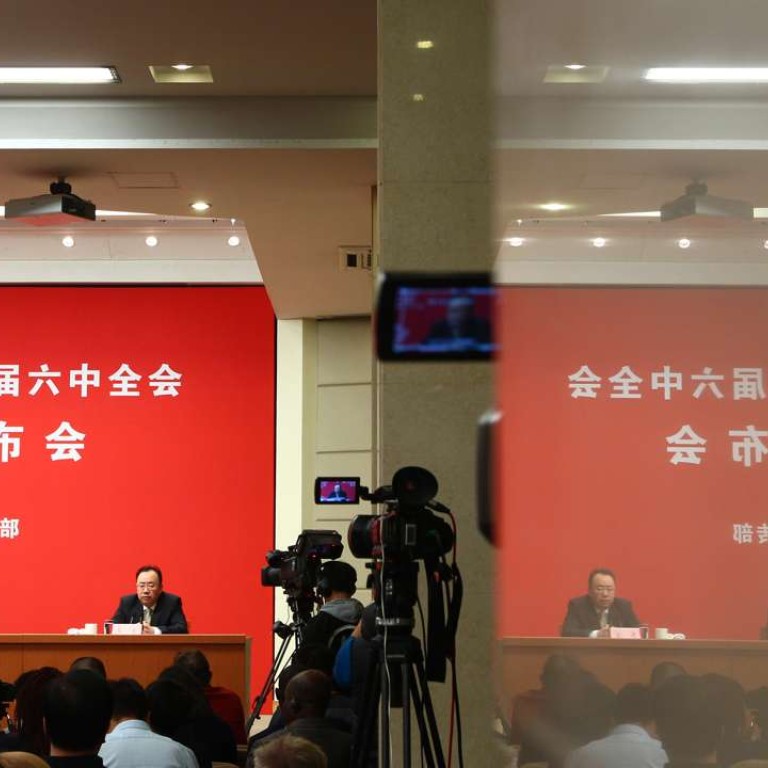
New Communist Party conduct rules to keep top cadres – and their families – in line
More than 160 detailed rules aim to ward off plague of corruption among senior ranks
The Communist Party will release a detailed set of rules governing the conduct of cadres, extending even into family life, amid a wider push to cleanse the upper ranks of sometimes overly cosy ties to lucrative businesses.
The official announcement came a day after the party wrapped up its sixth plenum in Beijing, which saw the status of party general secretary and President Xi Jinping elevated to the “core” of the leadership.
The party has adopted two sets of regulations covering senior cadres’ conduct, one dealing with political life and another addressing in-party supervision.
[Members] must strictly educate and regulate their relatives and assistants
Officials revealed on Friday that the first, more important set of guidelines would comprise more than 160 rules. Qi Yu, deputy director of the Central Organisation Department, told a press briefing that members, especially senior cadres, must maintain family discipline.
“They must strictly educate and regulate their relatives and assistants,” Qi said. “They must strictly implement the internal declaration [of assets] system.”
The regulations have yet to be made public and no date for their release was given, but they appear aimed at tackling corruption that fans out from senior officials into their family and associates.
A stream of revelations describing such networks in recent years has embarrassed the party and threatened to undermine its legitimacy. Prominent cases include former Chongqing party boss Bo Xilai, whose wife took bribes and was involved in the murder of a Briton, and former security tsar Zhou Yongkang, whose son took bribes and ran an illegal business. All four individuals have been jailed.
The detailed rules would focus on the more than 300 full and alternate members of the Central Committee, and especially the 25-member Politburo and its Standing Committee, which now has seven members. The first article would cover supervision of the Central Committee, said Wu Yuliang, deputy chief of the Central Commission for Discipline Inspection.
The new rules expand upon guiding principles that stipulate collective leadership is the party’s chief concern. Made up of 12 articles, that guideline was drafted by liberal-minded former general secretary Hu Yaobang and endorsed by the fifth session of the party’s 11th Central Committee in February 1980.
The resolution made explicit opposition to “rule by the voice of one man alone” or a “patriarchal system”.
It also encouraged internal democracy and barred members from showing loyalty to any single person.
At the time, the mainland was in a state of nationwide reflection on the Cultural Revolution, a decade of social and political upheaval unleashed by Mao Zedong’s call to eliminate what he called “the bourgeoisie”.
At a seminar on cadres’ political life held on Friday, Xi said it was necessary to strengthen conduct and that the old regulations were made under “certain historical conditions”, he said.
Some problems now were not present then, and some old problems then are no longer serious now
“Some problems now were not present then, and some old problems then are no longer serious now,” he was quoted by state-run CCTV as saying.
The party needed to make rules on political life more systematic and detailed, Xi added.
Gu Su, a professor of political affairs at Nanjing University, said the focus on senior cadres was important.
“Many senior cadres at the ministerial level or above have been found to be corrupt. They have received minimum supervision because of their ranking,” Gu said.
“Members of the Central Committee are at the decision-making centre of the party.
“It’s necessary to reserve part of the guiding principles for their supervision.”
While Xi did not elaborate on which problems were no longer serious, Qi told reporters that promoting in-party democracy and treating different opinions fairly, which were mandated in the original principles, remained unchanged.
The regulations would also take aim at overly ambitious senior politicians obsessed with power who formed their own factions or otherwise impaired the party’s unity, Qi added.
The Publicity Department would send out a team to tour the country and promote the decisions made at the plenum, its deputy chief Huang Kunming told reporters.


